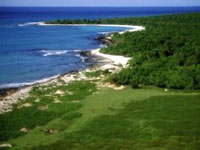Visit worldtravels.com for the full guide to Comoros. Build a complete Comoros travel guide and email to your clients - sign up for a trial subscription of World Travels Pro.
Comoros

Despite picture-perfect beaches, turquoise waters hemmed in by coral reefs, fantastic sunsets, and air scented with the tropical perfume of vanilla, nutmeg or ylang-ylang spices, the islands of the Comoros do not receive the same attention and approbation as their neighbours. A history of political instability has left the islands with one of the poorest and most undeveloped economies in the world, and since independence from France in 1975 the political atmosphere on the islands has been volatile and insecure.
Located almost halfway between the island of Madagascar and Mozambique, off the east coast of Africa, the archipelago constitutes four major islands that were formed by volcanic activity. Three of these islands form the Comoros, while the fourth, Maore (Mayotte), is part of France, choosing to remain under French rule after the other islands voted for independence. This divide in the archipelago has been the cause of many tensions, and despite being administered by France, the Federal Islamic Republic of the Comoros claim Mayotte as its own.
Of the Comoros islands, Ngazidja (Grand Comore) is the largest and the most westerly island, dominated by a large active volcano, Mount Karthala. It is also home to the capital of the Comoros, Moroni, a charming town with narrow winding streets in the old Arab Quarter worth exploring and several beautiful mosques. The sparsely populated island of Mwali (Moheli) is the smallest in the group and the least developed, with pristine tropical forest and secluded beaches. The most spectacular island, the 'pearl of the Indian Ocean', is Nzwani (Anjouan), the archipelago's main producer of perfume essences including jasmine and ylang-ylang, and also the most populated island. Its ancient capital and seaport, Domoni, was a major trading centre in the 15th century along the mercantile routes of the Indian Ocean from Africa to Asia, which became obsolete with the opening of the Suez Canal in 1869.
The cessation of maritime trade, together with the shrinking demand of its major exports and economy mainstays such as essential oils and spices, has resulted in these 'Perfumed Isles' becoming the 'Forgotten Islands' of the Indian Ocean. But the islands offer a fantastic holiday for those seeking a destination where nature and scenery hold the biggest appeal: there is superb diving in an underwater wonderland of corals and fish, a variety of animal and bird life that is unique to the islands, and diverse terrain from volcanic craters to undisturbed beaches to explore.
Climate
Located just south of the equator, the islands have a maritime tropical climate with a hot and humid wet season from November to April, and a cool, drier season between May and October. Rainfall and temperature vary from island to island, but generally temperatures average from 78°F to 86°F (26°C to 29°C) in the wet season and about 66°F (19°C) from May to October.
Money
The official currency is the Comoros Franc (KMF), which is divided into 100 centimes. Its value is tied to the Euro and many major tourist establishments accept Euros as payment. In towns, foreign currency can be exchanged at banks on Ngazidja, but banking facilities are limited on the other islands. The Banque Internationale des Comores (BIC) is the only bank that will change travellers cheques. To avoid additional charges take travellers cheques in Euros. There is no bank on Mwali. Banks are open on weekday mornings only, from 7am to 12pm. The acceptance of credit cards is limited to a few upmarket hotels.
Passport Visa
Return or onward air tickets and all necessary documents for the next destination are required. Visitors are given a 24-hour transit visa on arrival and have to report to the immigration office within that time to purchase a visa. Fees vary depending on length of stay.
Entry Requirements
- US nationals require a passport and a visa to enter the Comoros Islands. Visas can be obtained on arrival.
- UK nationals require a passport and a visa to enter the Comoros Islands. Visas can be obtained on arrival.
- Canadians require a passport and a visa to enter the Comoros Islands. Visas can be obtained on arrival.
- Australians require a passport and a visa to enter the Comoros Islands. Visas can be obtained on arrival.
- South Africans require a passport and a visa to enter the Comoros Islands. Visas can be obtained on arrival.
- Irish nationals require a passport and a visa to enter the Comoros Islands. Visas can be obtained on arrival.
- New Zealand nationals require a passport and a visa to enter the Comoros Islands. Visas can be obtained on arrival.
Health
There is a risk of malaria throughout the year, and dengue fever outbreaks occur. Cholera outbreaks also occur, but are a low risk to travellers. Visitors should drink bottled or boiled water as a preventative measure. Medical facilities are limited and medications may not be available. Travellers are advised to bring their own personal medical kit and travel insurance should be comprehensive.
Embassy Consulates
- Comoros Embassy, New York, United States (also responsible for Canada): +1 212 750 1637.
- Comoros Embassy, Pretoria, South Africa: +27 (0)12 342 0138.
Foreign Embassies
- United States Embassy, Antananarivo, Madagascar (also responsible for Comoros): +261 20 22 212 57.
- British High Commission, Port Louis, Mauritius (also responsible for Comoros): +230 202 9400.
- Canadian High Commission, Dar es Salaam, Tanzania (also responsible for Comoros): +255 (0)22 216 3300.
- Australian High Commission, Port Louis, Mauritius (also responsible for Comoros): +230 202 0160.
- South African High Commission, Moroni: + 269 7 73 4783.







